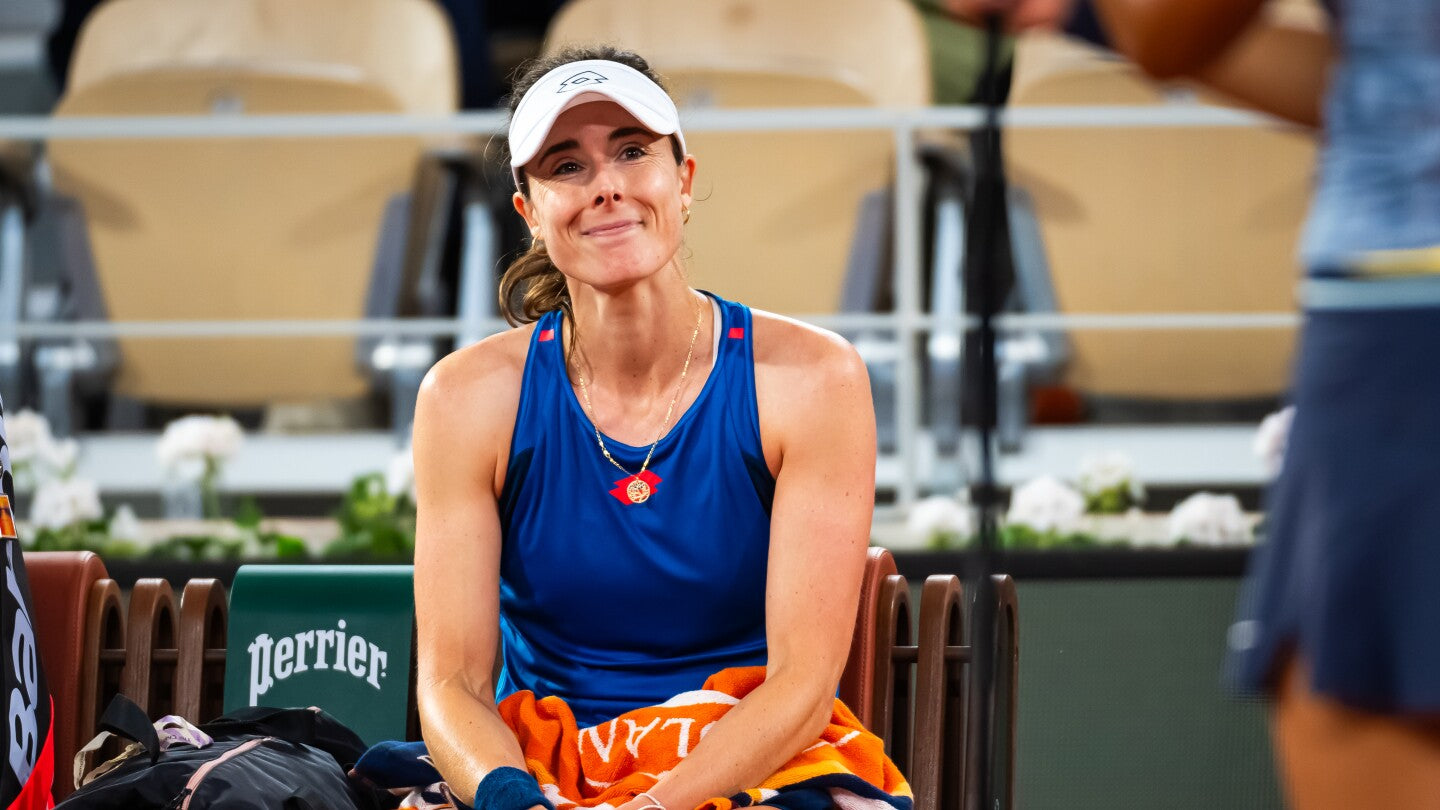I had something else in mind.
When I was younger and imagined the end of my career, particularly the months leading up to it, this isn’t quite how I pictured it.
I naively thought that as I approached the conclusion of my first life, I would have gained such perspective and experience that I would finally be able to play completely free and be myself in terms of tennis. Without hindrance or unnecessary burden.

I saw myself approaching each tournament with a smile, happy to live out my last months as a tennis player, grateful for what this life had brought me, while also relieved to say goodbye without regret. I could almost feel that long-awaited relaxation during my twenty-year career, that release in my strokes, and the desire to enjoy myself above all.
I dreamed of this end of career as a period where all expectations would be abandoned, where the game would take precedence over the stakes, and where, if I hadn’t been able to do so before, I could try things, take risks, and detach myself from the results. In short, dare.
This moment would inevitably come, and that thought reassured me.
After all, it would be now or never. And likely the easiest time to do it, knowing that I wouldn’t have any points to defend the following year, no more cuts to respect, nor an obsession with ranking. In theory.
I would thus approach the circuit with a light heart, simply desiring to say goodbye to the sport that had given me so much. All while maintaining my work ethic but without unnecessary pressure, without distractions because there wouldn’t be time for that. When our time is limited, it seems we focus on what’s essential.
It was a reasonable thought process.
But as you may have guessed, none of what I envisioned happened. None of those scenarios worthy of a Care Bears episode came to pass.

The explanation is quite simple, and despite my immense experience as a player, I didn’t see it coming.
You can’t just change years of conditioning rationally, let alone in a snap. It requires real self-work, a process of several months or even years. The human brain isn’t a magical slate that can be shaken to erase its contents simply because the time has come. It accumulates physical and mental habits, defense mechanisms, anchors, and knots that would take years to untangle. In high-level sports, these knots follow and limit us, and although I worked a lot mentally throughout my career, I relied on circumstances to make the tangle of thoughts that accompanied me from the very beginning disappear. A beginner’s mistake. It goes to show that even in a field one thinks they know by heart, learning never stops.
And while I relied on the magic of the career's end to trigger a change in me and give me the sudden ability to detach from the results, nothing budged an inch. Worse, disappointed to see that it made no difference, incomprehension crept in. Would I drag all my emotional baggage to the very end?

I still played my last tournaments with good intentions, setting achievable goals to keep things interesting, accompanied by Pierre, my partner, who took on the role of coach for the last eight months. We lived the end of the adventure together, traveling everywhere, sharing our visions. Everything was in place for a peaceful and serene ending.
This underestimated the complexity of this transition and the mental weight of twenty years of self-imposed demands and perfectionism.
So inevitably, those last months unfolded exactly like the rest of my career. I felt fear, expectations, stress, disappointments, discouragement, anger, frustration, and shame. I was sometimes eager to finish as quickly as possible, other times terrified at the idea of stopping. Sometimes from one day to the next, one hour to the next. What would my life look like without tennis when I had never known anything else? Should I push a little longer as long as my body allowed it? Was the timing right?
I thought the biggest emotional roller coasters were behind me, but perhaps it was at this moment that they made me the most dizzy. Tossed between my well-thought-out decision and the fear of what’s next, I tried to stay the course, find some enjoyment, and draw the strength to fight on the court.
From February to May 2024, I lost eight times in a row in the first round. Something that had never happened to me.
My goals, though achievable, took on disproportionate importance. After all I had experienced and accomplished, I still had things to prove to myself. To prove to others. And it would always be that way. As appealing as it seemed, I would never feel the joy of Carlos Alcaraz on the court, never reach the relaxation of Roger Federer, or the nonchalance of Petra Kvitova. However, I could reconnect with my legendary tenacity and fighting spirit. So, a few weeks before my last Roland Garros, with Pierre’s help, I made peace with myself and let go of the detachment that wouldn’t come.

It was decided: I would live these last tournaments like the others, with passion, commitment, determination, but also with my slightly darker side, my fears, my perfectionism, and everything that made me the player I was. It was time to finally accept all of this instead of fighting it.
In the end, I was about to achieve a goal that wasn’t one initially: to remain myself to the very end and embrace it. With this mindset, I reconnected with victory and thus fulfilled one of my last career missions: surpassing a thousand professional matches.
Then came Roland Garros. The last dance. The curtain call. Training while ignoring this imminent end was one of the hardest things I had ever done. I only played with girls I liked, trying to infuse positive energy into what broke my heart. Because choosing your exit doesn’t make it any easier to handle.
The announcement of the draw, the Philippe Chatrier center court, the goodbyes, the emotion, the four days of depression that followed, everything happened so fast. And since then, to my great surprise, everything is fine.

I haven’t touched a tennis racket since Roland, and everything is fine. I’m home most of the time, and everything is fine. I don’t have defined plans for my future, and I sometimes feel a bit nostalgic watching tennis on TV, but even then, everything is fine.
The stress has completely disappeared from my life, at least for now, and that’s really my favorite part.
I had been predicted a bit of everything for this retirement: the good, the less good, relief, sorrow, and ultimately, the only thing I hadn’t anticipated was that everything would be fine.
This adventure between the before and the after tennis could be illustrated by this expression that once again makes perfect sense:
“Life is what happens when we had planned something else.”
There’s no use in guessing your future, my friends, nothing will ever go as planned.
— Alizé Cornet


7 comments
Make every moment count, both on and off the court. Stay focused, give your best, and leave no regrets behind. Looking for the perfect place to play? Visit https://racketspotsph.wordpress.com
Je vous remercie passionnément pour toute l’intensité et le talent dont vous avez fait preuve au fil du temps, vous avez été merveilleuse à suivre et avez très certainement inspiré un très grand nombre de joueuses et joueurs.
Je me permets mais ne serait-ce pas plutôt John Lennon dans « Beautiful Boy » ?
« Life is what happens to you while you’re busy making other plan ».
Merci encore,
K
Bravo Alizé pour ton écriture qui nous cueille au début de l’article et ne nous laisse atterrir qu’une fois atteinte cette belle conclusion. Oui, "vraiment pas mal ":))
Ton récit m’a rappelé combien j’aurais voulu que tu puisses goûter sur le plan sportif à un “final run” que quelques-uns ont connu (je pense à Benneteau, à Gilles Simon, …). Le trajet n’était pas dessiné comme ça.
A la place, j’ai en mémoire une interview sur le court émouvante, une très belle touche finale … avant de voir la même Alizé revêtir dans la foulée, avec aisance et talent, le costume de commentatrice du tournoi sur France TV. Chapeau !
Et une surprise de plus quand j’ai lu sur Instagram, alors que tu entrais dans l’après-tennis sous le signe du sourire, ta légende sous une de tes photos “So many reasons to smile”. Une bien belle devise au quotidien, j’ai adoré.
The story ALize shared touched and inspired me a lot. It take courage to face our true self and let go of things that we can’t change. We are all imperfect but it doesn’t mean that we don’t deserve to be loved or respected. Most importantly, we need to love ourselves first.
Alize’s words were so beautifully constructed.Thank you for sharing your story with us.
Que de belles choses si joliment dîtes sur les surprises de la vie .